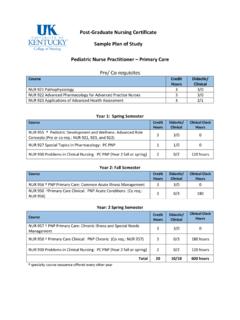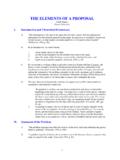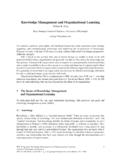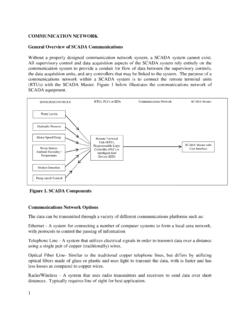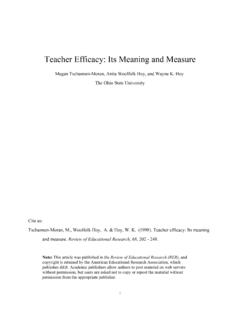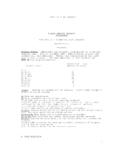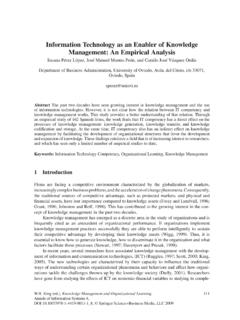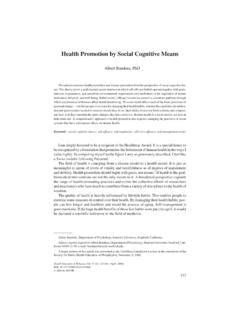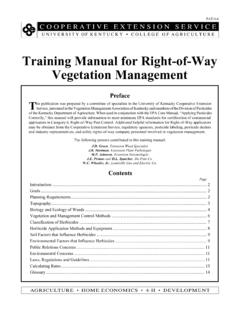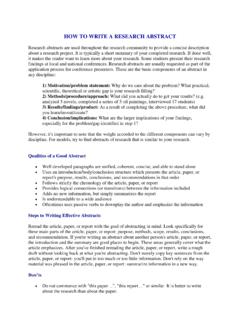Transcription of “Methods of Measuring Public Opinion”
1 Public OPINION IN THE 21ST CENTURY. DRAFT: NOT FOR QUOTATION OR CITATION. Russell G. Brooker, Alverno College Todd Schaefer, Central Washington University Methods of Measuring Public Opinion . Truth reveals itself in degrees, and we can progress from an incomplete to a more and ever more complete comprehension of truth. Truth is not a thing, not an object that we either have in entirety or have not at all.. - Goethe The formal academic study of Public opinion is relatively new but the practical study of Public opinion is not new at all. Governments have paid attention to Public opinion as long as there have been governments. Even the most oppressive tyrants need to know what the people are thinking, even if just to oppress them more effectively. As the famous investigator of Public opinion, Key, Jr. said, Governments must concern themselves with the opinions of their citizens, if only to provide a basis for repression of disaffection.
2 (1961, 3). One of the earliest expressions of Public opinion was rebellion. Peasant rebellions have occurred throughout history. When the king saw his subjects in open rebellion, it was a pretty clear sign that the Public 's support for his government was eroding. Unpaid taxes was another clue; when rulers saw their tax receipts dwindle and heard reports of tax collectors being killed, they knew that Public opinion was turning against them. For centuries rulers have established secret police forces to find out which people oppose the government and to eliminate them. Secret police have, among other things, acted as monitors of Public opinion. Fortunately, not all governments need to hire secret police or wait for peasant rebellions to learn about Public opinion. Democratic governments, especially, have much better procedures to learn about Public opinion and measure it. In this chapter, we explore ways that governments can learn about, and act on, their citizens' opinions.
3 We classify the methods of learning Public opinion into informal and formal methods. The informal are very important but they do not involve any formal explicit research methodologies. Informal methodologies include elections, letters from constituents, media coverage, and protest marches. Formal methods, on the other hand, involve definite research designs and formal research methodologies; they are methods designed by experts to research Public opinion. Examples of formal methodologies are telephone surveys, focus groups, and content analysis. In this book, like practically every book on Public opinion, we devote most of the coverage to formal research methods, especially survey research. But because of our focus on how opinions held by members of the Public get translated into Public policy, we spend more time on the informal methods here than is customary in a book like this. We attempt to view Public opinion as governmental decision makers would see it.
4 In the real world of politics, these governmental leaders find out about people's opinions in a variety of ways, both informal and formal. We will once again emphasize the informal ways that political leaders learn about Public opinion in the chapter on political participation. We will see in that chapter that the informal methods tend to favor the wealthy and educated members of the society. 1. I. Informal Ways to Measure Public Opinion A. Elections The most common way for a democratic government to learn about Public opinion is through elections. Elections are built into the system, at regular intervals in the United States and at irregular intervals in other democratic countries. They are important because they determine who staffs the government, and they are also one way for the Public to express its feelings about politics. But they are not a particularly precise method for ascertaining Public opinion. Politicians and researchers may try to figure out why one person won an election rather than another, but usually there are so many factors that it is impossible to single out one or a few and the reason or reasons.
5 A candidate may have won because he or she is in touch with the voters and understands their needs better than any other candidate. But, on the other hand, a candidate may have won because he or she is a better speaker or because of more or better television advertisements. Even if a candidate won on the issues, it may be difficult to determine which issues were most important. Some voters may have decided on the basis of economic issues, while others decided on the basis of a candidate's stand on abortion or gun control. In the end, all that elections tell us about what the Public wants is that they preferred one candidate over another not why. Elections are also imperfect measures of Public opinion because they reflect only the opinions of those who voted. Certainly, in societies in which all adults have the right to vote, elections can reflect the various views of all the people. But in practice, not everyone votes especially in United States, where only about half the eligible voters participate in presidential elections, and even fewer do so in other elections.
6 Therefore, elections tend to reflect the views of those who vote, who are not necessarily representative of the Public . As we shall see later, elections tend to reflect the viewpoints of more educated, wealthier citizens. While elections are a blunt measure of Public opinion, they are the most effective means by which Public opinion can control the government and Public policy. Elected politicians, who are future candidates, will avoid taking especially unpopular positions on issues because they know that voters might notice and could show their displeasure at the polls. If voters do not notice a candidate's position on their own, opposing candidates will be happy to point it out. In this way, elections serve to hold politicians accountable to voters' opinions even latent opinions that the voters may not consciously hold. Politicians' perceptions of Public opinion, then, may be as important as the actual Public opinion itself. A.
7 State legislator may refrain from voting for an obscure but unpopular bill because she is afraid that constituents would be offended and vote for her opponent in the next election even if, in fact, they would never know. B. Interest Groups and Lobbying: It may seem unlikely that interest groups would be valid measures of Public opinion. They are remarkably unrepresentative of the Public as a whole. The wealthy and the educated members of society are much more likely to be organized into interest groups and employ representatives. The poor and uneducated are much less able to speak to the government through lobbyists. Nevertheless, legislators, staffers, and other government personnel do pay attention to what interest groups say. They have good reason to do so. Good lobbyists tend to be well informed about their issues concerning their employers, they have access to facts necessary to write laws, they understand the political process, and they are present when necessary to answer questions.
8 In a study of committee staffers in the Illinois state legislature, Susan Herbst (1998) found that the staffers did pay a great deal of attention to lobbyists and, in fact, considered what they said to be Public opinion. Herbst was very clear that the staffers did not merely consider their views to be surrogates for Public 2. opinion; they considered them to be Public opinion. The staffers relied on lobbyists to be their conduit to understanding Public opinion partly because they perceived them to be in touch with the people of Illinois and to honestly relay the people's opinion. The staffers felt that the lobbyists were honest because their credibility would be ruined if they were caught lying. Another reason the staffers relied on the lobbyists to understand Public opinion is that the lobbyists were always there and were knowledgeable about the issues and the bills being considered in the legislature. While the Public might be for lowering a tax, ordinary people would not understand how a tax could be lowered or how much it could be lowered.
9 The lobbyists could. The staffers, according to Herbst, saw ordinary citizens as lazy and uninterested in politics. C. The Media: Many government officials, and many regular citizens, look to the media to understand the views of the Public . In Herbst's study, she found that legislative staffers also considered the media to accurately present Public opinion. The media are important in understanding people's opinions, and we will devote an entire chapter to the media later in this book. Media, such as television, newspapers, and magazines are important because of the news they choose and how they portray the issues. In other terms, they are important in determining the political agenda (what people in the government are thinking about) and in framing the issues (how the issues are being considered). The print media are also important as conduits of opinions from editorialists, columnists, and ordinary people who write letters to the editor.
10 Most large newspapers print the opinions of their editors and run the articles of liberal and conservative columnists. Most also print letters to the editor that that allow ordinary people the power to express practically any sort of opinion. Some magazines, such as Time and Newsweek cover politics in an essentially nonpartisan way, but there are many more magazines that represent practically any political point of view in the American political spectrum. Conservative magazines such as National Review express views right of political center, while liberal magazines such as The New Republic tend to explain politics from a more left-leaning point of view. These ideological magazines are useful for explaining their perspectives to their readers and to government officials. Conservative, or liberal, elected officials often look to conservative, or liberal, magazines for support and justification of their opinions. D. Letters and Calls: People use letters and telephone calls to express their opinions to their elected representatives.
